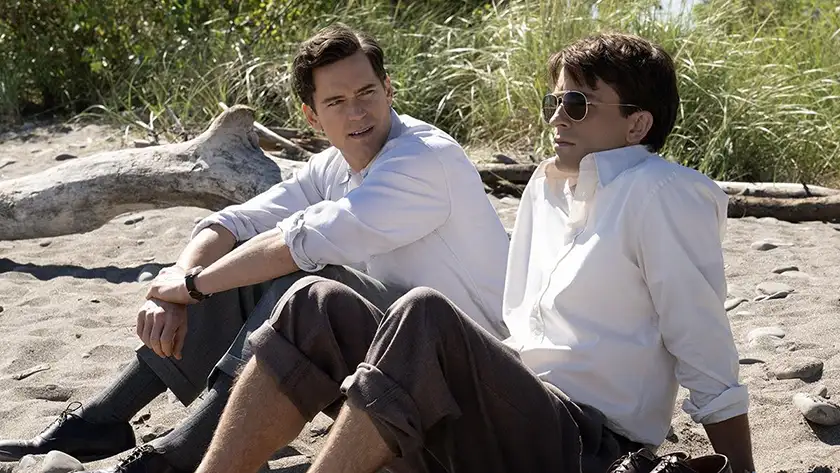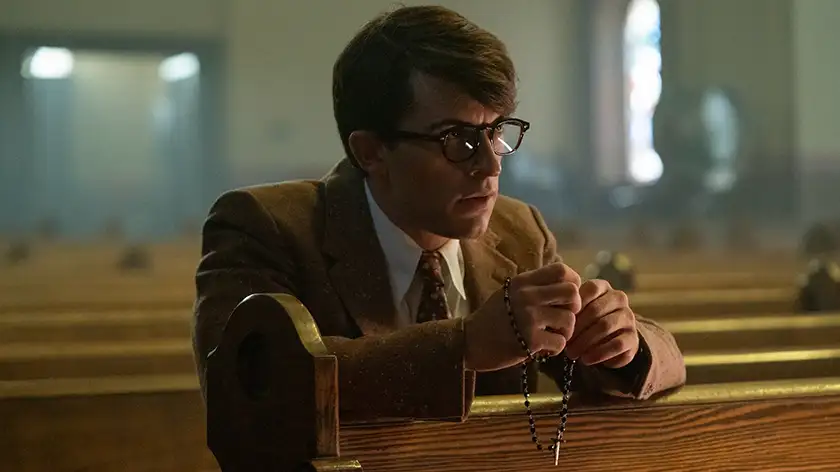Fellow Travelers underscores why Tim Laughlin’s conflict between his unwavering faith and his fervent sexuality matters, delving into the profound impact this struggle has on his personal identity and relationships.
Set in Washington, D.C. during the McCarthy era of the 1950s, Fellow Travelers revolves around the lives of Hawkins “Hawk” Fuller (Matt Bomer, of Maestro), a young State Department employee, and Timothy “Skippy” Laughlin (Jonathan Bailey, of Bridgerton), a gifted novelist and a closeted homosexual with a powerful relationship to his Catholic faith. As the two become immediately drawn to each other and sexual relationships begin, Tim begins to realize that the conflict between his religion and sexuality matters deeply to him.
In addition to exploring the complex relationship between Tim and Hawk, Fellow Travelers explores the intense scrutiny and persecution of individuals suspected of being homosexual or communist during that time. The historical drama vividly portrays the pervasive fear and suspicion that characterized the political landscape of the 1950s. Set against a backdrop of witch hunts and loyalty tests, the series highlights how the government’s anti-communist crusade extended its reach to target those within the LGBTQ community, branding them as security risks.
The Lavender Scare, a lesser known but equally insidious parallel to the Red Scare, saw countless federal employees interrogated, outed, and dismissed from their jobs solely based on their sexual orientation. Fellow Travelers meticulously captures the atmosphere of paranoia and the devastating personal and professional consequences faced by those ensnared in these purges.
As a devout Catholic who dutifully attends daily Mass and confession, Tim adeptly isolates his sexuality, keeping it separate from his life, never overlapping. However, as his affection for Hawk intensifies, Tim finds himself struggling with his unwavering faith and his conflicting sexual desire to be with the man he yearns for.

Rarely does a television series resonate so deeply that it feels tailor-made for one’s own experience. My own struggle with sexuality and having a strong relationship with Catholicism made it difficult for me to live the life that I wanted. I attended private Catholic schooling for most of my life, where it was ingrained in me that to partake in the Eucharist, we must be free from mortal sin, including carnal sin. The Catholic Church contains dogmas and teachings that consider homosexual acts as intrinsically immoral and contrary to natural law. Although being gay is not considered a sin in and of itself, there is a large negative attitude towards it. Furthermore, homosexuals are called to chastity.
I profoundly defended my steadfast faith just as Skippy did in several instances in Fellow Travelers. In the later years, I attended mass, prayed, and nervously went to confession. There was an inner conflict within me trying to make sense of what was happening. I ignored the inkling that I was somehow different. I became nauseous. I became anxious. I became depressed. I pushed this inkling to the darkest of depths in my mind. In what felt like a lifetime of internal struggle, I came to accept that I liked guys. I was gay, and because of this, I became someone else.
It is no surprise that Tim and I grew up in a conservative society surrounded by Catholicism. Due to this, we internalized a sense of shame and guilt about our sexuality from fear of being shunned and rejected by society. The faith instilled in us led us to believe that homosexuality is sinful, sparking an internal struggle filled with self-reproach and condemnation. How were we supposed to openly love someone without being criticized? As a result, we were compelled to hide our true selves. Tim cannot openly care for the man he loves, not only because of the era he lives in but also because his faith dictates that it is not natural. I am well aware what the faith dictates, but I live in a different era. What personally held me back from coming out was rejection. Due to these conflicts, Tim Laughlin and I lived a double life where we concealed our homosexuality from those around us.
There are so many beautiful and heart-breaking scenes in Fellow Travelers that it would be impossible to share them all with you. However, this quote impaled a knife in my heart because of how true and divine Tim and I found it to be. Laughlin is in confession with a priest to which he asks Tim if he is aware that his sexual actions are a mortal sin in the eyes of the Church. To which Tim brilliantly responds, “I am. But I don’t know how love can be a sin.”
How can love be a sin? Tim struggles to find peace and understanding between God and love for most of his life, as he carries so much guilt for his sexual identity and actions in the eyes of the church. He heartbreakingly admits to Hawk that in the past, he held two truths – his love for him and his love for God. Skippy further explains that one was real and the other a fantasy. Tim comes to understand the concepts of God and love as something “beyond measure”, implying an abundance and infinite quality to the love Tim carries for Hawk despite everything they have gone through.

With each revelation about myself, discussing my attractions and dating experiences with friends felt incomplete and half-hearted. If I could not be true with myself, how could I be true with my family and friends? While discovering who am and simply exploring, I felt like a baby learning to walk, navigating unfamiliar territory with uncertainty and trepidation. As I slowly embrace my identity as a gay person late in life, I feel myself gradually drifting away from the spiritual sense of grounding that always surrounds me and kept me in conflict.
Everyone’s story has a distinct ending, and it should be up to each person to dictate how they want their story to conclude. There will always be obstacles to face, no matter the era, no matter the religion. The relationship between Tim and Hawk in Fellow Travelers is a poignant exploration of the profound challenges faced by LGBTQ+ individuals who grapple with the intersection of religion, society, and personal authenticity. Tim’s conflict between his faith and sexuality is not only an important and captivating tragedy, but it serves as a reminder of why self-acceptance, empathy, and understanding in the face of discrimination and prejudice matter.
Fellow Travelers is now available to watch on digital and on demand.

